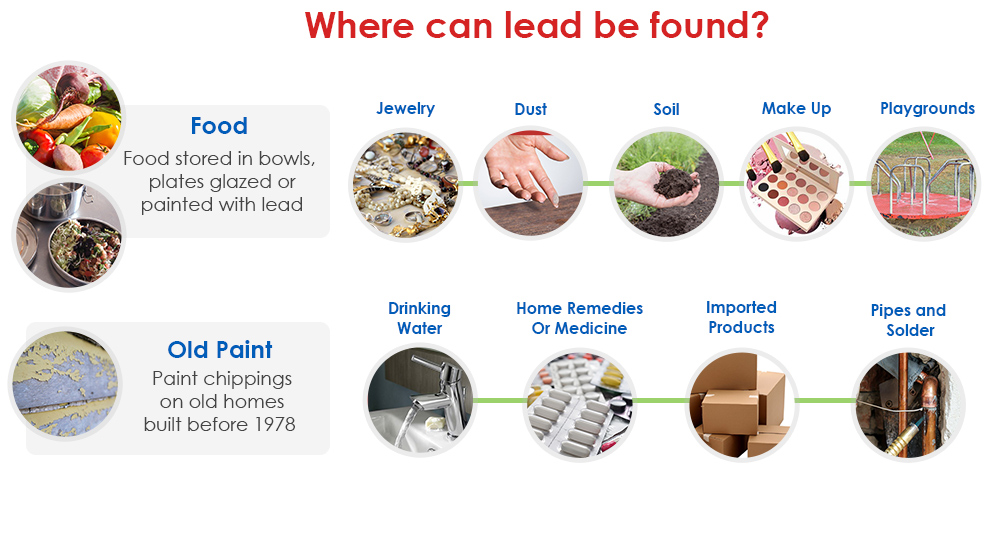Lead poison is 100% preventable. All Health Plan of San Joaquin / Mountain Valley Health Plan (“Health Plan”) children qualify for a Lead Poison Screening. Start by talking to your doctor on how to get one done. Lead is a highly toxic metal and has harmful effects on children from ages 6 months to 6 years. Even low exposure can cause permanent damage to the body. It can affect their learning and their ability to pay attention. It is very important to prevent lead exposure.
Young Children absorb 4 – 5 times more lead than adults and can affect every organ in the child’s body.
Simple Ways to Protect your Child from Lead Poison:
- A lead screening test is free for Health Plan members. Ask your Health Plan doctor about how to get a lead test done.
- Clean your home and toys regularly.
- Teach your children to wash their hands, especially before eating.
- If you work in an environment that has lead, make sure you change your clothes and shower as soon as you get home.
To learn about testing your home for lead exposure, start by calling your local health department.
- San Joaquin County 1-209-468-2593
- Stanislaus County 1-209-558-8860

Where can Lead be Found?
The most common way to get lead poison is by exposure and ingesting dust, dirt, and old paint chippings.

Frequently Asked Questions
Lead poisoning happens when too much lead gets into the body through the skin or from breathing, eating, or drinking.
Children 6 months to 6 years old are at highest risk because they do more hand-to-mouth activity. This age group also spend most of their time at home, day care or older buildings.
It is important to prevent lead exposure before it occurs. Lead poison is harmful and can cause permanent damage to the body and the brain. Lead exposure can cause:
- Damage to the brain and nervous system.
- Slow growth and development.
- Cause learning and behavior problems that lead to hearing and speech problems.

Some children have no signs of being sick. Others may have symptoms like:
- Headaches
- Loss of appetite
- Nausea and vomiting
- Muscle and joint weakness
- Behavioral problems and trouble concentrating
- Increased antisocial behavior
- Metallic taste in the mouth
Ask your doctor about having your children tested for lead exposure. Your doctor will ask you questions to see if your child is at risk for lead poison. A capillary test or a prick on the finger will test the blood to see if there are any lead levels in the blood. If lead is found, your doctor will refer you to a lab to get your child blood’s drawn. A follow-up appointment with your doctor will be needed.
There are 2 types of tests:
- Capillary test –in-office visit; this will test the blood to see if there are any levels of lead.
- Venous blood test – this can be done initially, or as a follow-up test if they find high levels of lead.
Lead is a highly toxic metal that can be found in soil, food and water. Not everyone with lead in their blood will have obvious symptoms. Even with a small amount of lead in the blood can be dangerous.
If you think your child has been exposed to lead you can get a screening done. All children should get a lead screening test done as early as 6 months old. It is important to get testing at one year and 2 years of age. The only way to know a child has lead poisoning is to get a blood test for lead.
A test would be done at ages 1 and 2. If the child missed the test during those ages it can be done at 2 – 6 years old.
There is no safe lead level in the blood for children. Children are especially at risk from lead because of their small size and developing brains. Keep your home lead–free. Removing all sources of lead exposure is important before a child is harmed
Researchers continue to study how lead exposure might affect a developing fetus or infant. High blood lead levels during pregnancy can result in:
- Bleeding
- Miscarriage (death of fetus)
- Stillbirth (dead at birth)
- Low birth weight
- Premature birth
- Hearing
- Vision
- Ability to Learn
Helpful Resources
Health Care and Community Health Workers play an important role in preventing childhood lead poison. By assisting in screening, reporting, and providing education, you can advocate for families with children who are at high risk of lead poisoning. Start by working with your local public health officials.
Additional Resources
- Health effects of lead poison
- Blood levels of lead poison
- Learn about who is at the highest risk
- Childhood Lead Prevention Program Branch
- Resources for Staying Lead-Safe During COVID – 19
- Lead Poisoning
- Why lead poisoning is a danger to your child’s health
- San Joaquin County Public Health Services Childhood Lead Poisoning
- Prevention Program
- Stanislaus County Childhood Lead Poisoning Prevention Program
- United States Consumer Safety Commission
- Lead Away!
Know your rights

Advice Nurse Line
Sometimes you need to talk to a nurse when you cannot talk to your doctor. The Advice Nurse helps you with any health problem you or someone in your family has. Click here for more information.
HealthReach 24/7 nurse and doctor advice line, call toll free:

Posted on February 7th, 2025 and last modified on April 23rd, 2025.
top